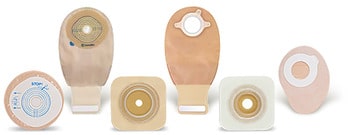Colostomy
What is a Colostomy?
A colostomy is when the large intestine and the flow of fecal body waste are surgically redirected into an artificial opening made in the abdomen. This opening is known as a stoma. After surgery, colostomy supplies work to collect the redirected flow of stool through the stoma.

When is a Colostomy Necessary?
In a healthy digestive system, after you swallow your food, it passes through the esophagus and stomach. From there, food (now partially digested) moves into the small intestine. The small intestine (ileum) works to process water and nutrients from your food. Finally, the large intestine (colon) handles absorbing more water and forming stool to store until you’re ready to go to the bathroom.
However, when the colon becomes diseased or injured, a colostomy may be medically necessary.
The new colostomy may be permanent (known as an “end colostomy”) or temporary if the bowel just needs time to heal, as in the case of bowel surgery or injury.
The reason for needing a colostomy may dictate the position of where your stoma will appear. Your doctor determines this based on your diagnosis and the specific area of the colon to bypass. This may also affect how firm or loose your stool will be as it leaves the body and enters your colostomy bag for storage.
Reasons for Needing a Colostomy
- Inflammatory Bowel Disease (IBD), such as ulcerative colitis or Crohn’s disease
- Colon cancer or rectal cancer
- Blockage of the bowel
- Injury
- Serious infections like diverticulitis
What to Do After Colostomy Surgery
It’s understandable to go through a lot of feelings following your colostomy surgery. This is a big life change.
First, we want to assure you that you are not alone. An estimated one million people in America live with an ostomy too. Although it can feel daunting to face life with a new colostomy at first, many people experience a better quality of health after colostomy surgery.
Post-surgery, take time to rest and heal before taking up physical activity or new adventures. Your doctor and/or WOCN (Wound, Ostomy, and Continence Nurse) will be able to let you know when you’re clear to begin exercising and living life normally again post-surgery. You may be given basic instructions on how to use colostomy supplies. Additionally, you will learn how to clean and care for your new stoma.
Your healing time at home can be a good opportunity to learn more about living with a colostomy. We offer a helpful blog of ostomy resources that links to online ostomy support groups, online communities like me+, and other links you may find useful. Plus, through 180 Medical, you have a way to speak with a team of certified WOCNs who are available for medical questions and concerns.
Need more information about your new colostomy and stoma? Take a look at Convatec’s guide for Living with Confidence after Colostomy Surgery.
Where to Get Colostomy Supplies
So you’ve had colostomy surgery. That means you’ll need to find a reliable ostomy supply provider for your colostomy supplies, such as colostomy bags, skin barriers, and other accessories.
180 Medical is a trusted source of top-quality ostomy products as well as intermittent catheters and incontinence supplies. We aim to offer our customers the kind of service we’d give our own loved ones. You’ll receive compassion and understanding from our knowledgeable Ostomy Specialists as we work with you to determine a customized colostomy supply order for you.
Plus, no need to worry about ordering your colostomy products through your local pharmacy. 180 Medical discreetly ships your order right to your door. That’s just a fraction of what we do to make the process of getting your colostomy bags less stressful for you.
Experience the 180 Medical difference and contact us today!
